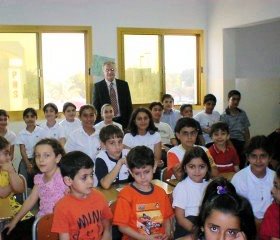
Azad-Hye,
The Message which will be read in all the dioceses in the coming weeks refers to the mission of the Armenian school, considering it a stronghold for the Armenian nation and the focal point of the Armenian community life.
In the second part of the Message,
 He particularly pointed out the need for creating a new educational system, reorganizing the existing one, building new schools, trying to balance the budget and working hard especially on re-qualifying teachers.
He particularly pointed out the need for creating a new educational system, reorganizing the existing one, building new schools, trying to balance the budget and working hard especially on re-qualifying teachers.
Various activities in the Communities during 2006 will highlight the theme of the Armenian school. This follows previous year focus on other subjects: 2003 was marked as “The Year of the Holy Bible”, 2004 “The Year of the Armenian Family” and 2005 “The Year of National Struggle” (coincided with the 90th Anniversary of the Genocide).
In the Middle East, Armenian daily schools exist in
An imminent problem is the quality of the teachers employed in the Armenian schools. Due to limited salaries and the obvious absence of long term planning, specially in the field of pedagogic needs, the Armenian schools are being manned with under qualified female teachers (male teachers are non-existent species), with high turnover rates. The number of students who are financially supported to take graduate studies in humanitarian subjects is very low. Also opportunities in front of those who have undertaken the pain (with the financial aid of their parents) to do such studies are severely restricted.?
?
PHOTO: Schoolchildren of the Abu Dhabi Weekly School with?a visitor (2002).?
